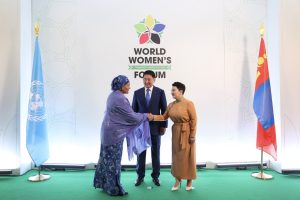Mongolia’s feminist foreign policy took another leap by organizing the first World Women’s Forum (WWF) in Ulaanbaatar to reaffirm its commitment to the 1995 Beijing Declaration and Platform for Action and the 2030 Agendas for Sustainable Development. The WWF was convened in recognition of the centennial anniversary of establishing the Women’s Federation of Mongolia. The forum, held on August 22 and 23, served as a mechanism for female world leaders to discuss issues – and seek solutions – in a united front.
The WWF built on the 2023 Ulaanbaatar Declaration, which was issued after Mongolia’s hosting of a female foreign ministers’ meeting. The 2023 meeting gathered female ministers from France, Germany, Indonesia, Liechtenstein, Mongolia, and South Africa to discuss feminist foreign policy.
The 2024 World Women’s Forum was convened under the auspices of President Khurelsukh Ukhnaa and co-organized with the Foreign Ministry of Mongolia and the United Nations. The WWF successfully gathered around 800 female leaders, including 19 high-level leaders, 20 government and non-government organizations, civil society representatives, and 600 Mongolian female leaders from all sectors.
In his opening speech, Khurelsukh highlighted the dire need for action to achieve gender equality and inclusivity in emerging issues such as climate change. He also highlighted the opportunities female decision-makers can create for women and girls.
In her opening remarks, Mongolian Foreign Minister Batsetseg Batmunkh underscored the necessity of accelerating cooperation between different nations and cultures to empower women by creating opportunities in non-traditional sectors such as digital economy, security, sports, and environment. She also pushed for gender equality in global good systems and climate change.
Battsetseg spoke optimistically of the progress made over the past 30 years: “Nearly three decades have passed since the 1995 Beijing Declaration boldly proclaimed, ‘women’s rights are human rights,’ setting forth a global commitment to dismantle barriers to gender equality. Since then, progress has been made – discriminatory laws have been reformed, gender-based violence is being challenged, and more women and girls are stepping into classrooms, the workforce, and positions of power.”
However, she also acknowledged there is much work to be done. “I firmly believe that many of the challenges women face worldwide – the inequitable opportunities and the struggles to overcome systemic barriers – are closely tied to the level of education they receive” Battsetseg stated. “Therefore, I encourage you to place women’s education at the forefront of our discussions and seek solutions through this critical lens.”
As guest of honor at the World Women’s Forum, the first female president of Slovenia, Nataša Pirc Musar, applauded Mongolia’s initiative to create a space to discuss these issues. In her remarks, she emphasized the need to make gender equality into gender equity. Pirc Musar particularly called for an end to “horrific crimes” against girls and women “Palestine, Afghanistan, Syria, Ukraine, Sudan and other war-affected countries.”
The WWF was attended by other high-level guests from Laos, Kyrgyzstan, Bulgaria, Turkey, France, the United Kingdom, and the United States. Representatives from international organizations included Tatiana Valovaya, the director general of the United Nations Office at Geneva; Cindy Bishop, the U.N. Women goodwill ambassador for Asia-Pacific; Nala Amirah, a young climate activist from Indonesia; Maria Fernanda Espinosa Garces, a former president of the U.N. General Assembly and executive director of the Group of Women Leaders; and Amina J. Mohammed, the deputy secretary general of the United Nations and chair of the United Nations Sustainable Development Group. Each urged accelerating gender equality.
Mongolia’s hosting of the first World Women’s Forum not only demonstrates Ulaanbaatar’s feminist foreign policy elements but also seeks integrated ways for Mongolian policymakers to support global missions such as the 1995 Beijing Declaration and Platform for Action and Sustainable Development Goal of 2023. As Ulaanbaatar’s multi-pillared foreign policy expands to address social issues – such as gender equality – in more of an international environment, forums and dialogues will continue to play a pivotal role in creating opportunities for Mongolia to be an active player in global affairs.
Moreover, Ulaanbaatar’s feminist foreign policy approach – both in principle and in action – seeks to find a permanent solution to overcome social barriers for Mongolian women and girls to succeed and thrive in modern society. The recent parliamentary election and current government resulted in the highest number of female leaders in Mongolia’s history. In 2022, Mongolia appointed its first female general, Bolor Ganbold.
Importantly, the dialogue also focused on the intersection between gender equality and other pressing social issues, such as the green transition. In fact, the forum’s theme was “Towards a Green Future,” and climate issues recurred frequently throughout the discussions. For example, during the “Towards Gender Equal Economies” session, Oyun Sanjaasuren, a leader in Mongolia’s climate sector emphasized the current green transition as an opportunity for gender inclusivity and supporting women-led energy efficient small- and medium-sized enterprises.
Odontuya Saldan, a member of parliament who is also serving as minister of environment and climate change of Mongolia, told The Diplomat that one of her ministry’s goals is to establish a Working Group on issues relating and connecting to women in climate change. That way, she said, even though the World Women’s Forum is over, female leaders and climate activists can cooperate and partnership on a variety of issues. Those partnerships can produce a positive outcome on multiple continents, including Mongolian women and girls’ lives.

































